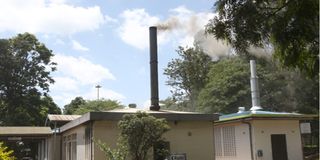Of crematoriums, cemeteries and your last rites

The Kariokor crematorium. It costs Sh50,000 for non-Hindus to be cremated in Kariokor. It doesn’t matter if you choose the electric furnace or the wood fire, the cost is the same. The cost is lower for Hindus.
What you need to know:
- The biggest cost in a funeral budget has nothing to do with the dearly departed.
- The biggest cost is to put food and drink into the stomachs of those who have come to see their departed off.
- A standard Kenyan funeral does not just honour the life of the departed – it quenches the thirst and hunger of the living attending the ceremony.
Friday, late morning, I am at the Hindu Crematorium in Kariokor, Nairobi.
My curiosity has brought me here, to this crematorium, to this place where every day is a ceremony for the dead to leave their earthly bodies behind.
It is the end of one journey, perhaps the beginning of another.
I meet a man called Robert. Robert is the heart and soul of this place, the pen and paper, the machinery that keeps its cogs churning.
Heck, he is the fuel of his own machinery. He indulged my curiosity and showed me around, and we talked. A lot.
Talking to Robert made me feel… reassured. And comforted. It was like sipping from a bowl of warm soup.
Robert has been cremating bodies here for over 25 years. He has had the honour of administering the final rites of hundreds of folk, including the who’s who of this town.
Robert is unmoved by the seemingly unsettling nature of it all – this his job, he says, this is what he does. He cremates.
Earlier that morning, he had put a man’s remains – and his casket – into the crematorium. He has another one to run this afternoon.
The crematorium in this new wing is a stainless steel electric furnace that hums with efficiency. It’s sleek and modern, expressionless. It runs on electricity, a generator snarled behind it like a vicious pet.
Fragility of immortality
The entire ensemble smelled of nothing but the fragility of our immortality. It’s a fragility Robert has come to embrace, anticipate even, he cannot outrun his fate any more than he can have a cup of tea while the crematorium runs. Not even with those weathered Nike’s on his feet.
Not too far from these modern crematoriums are the traditional crematoriums. The cremations here are fueled by firewood, sawdust and the spark from a flame.
It costs Sh50,000 for non-Hindus to be cremated in Kariokor. It doesn’t matter if you choose the electric furnace or the wood fire, the cost is the same. The cost is lower for Hindus.
I am here at the crematorium because of a story I’m writing, about the finances of funerals in Kenya.
This is my final stop – I’ve already visited a handful of funeral homes in Nairobi, collected pamphlets, and crunched the numbers from funeral budgets.
The finances of funerals are a galvanising revelation to me. I didn’t know, the cost of a standard Christian funeral goes into the hundreds of thousands. It costs more if you bury your loved one upcountry than if you cremate them here in Nairobi.
What fascinates me the most is this: the biggest cost in a funeral budget has nothing to do with the dearly departed. The biggest cost is to put food and drink into the stomachs of those who have come to see their departed off.
A standard Kenyan funeral does not just honour the life of the departed – it quenches the thirst and hunger of the living attending the ceremony.
Perhaps if we didn’t have to feed people at funerals, then the cost would be more manageable for the family.
But then again, we are Kenyans after all, we don’t invite people into our homes and then send them off with an emptier stomach than they came with. We must all drink and dine together.
Spending my Friday morning with Robert at the Hindu Crematorium has forced me to confront my preferences: when I die, do I want my remains buried or cremated? What about you dear reader, buried or cremated?
I asked this question to my online community on Instagram. (Follow me, by the way, my handle is @_craftit.)
Informal poll
I conducted an informal poll on my stories – 43 per cent of those polled say they want to be cremated, 23 per cent say they want to be buried, and the other 34 per cent say they are not sure yet if they want to be buried or cremated.
I went on to ask them why they chose the option they chose. A majority of those who want to be cremated pointed out that it will save their family all the trouble of a burial; time, money, and the logistics of travel upcountry. A handful of others say they didn’t want all the fuss of burials.
Others talked about the outcome of cemeteries, and the what-next of graveyards. One person said, ‘Land becomes unsellable when you bury someone there.
You would be hard-pressed to sell land your family is buried on. Neither would you buy land from someone whose family you know is buried there.’
Cemeteries and graveyards have a lot of sentimental value but little market value.
Those who chose to be buried cited the familiarity of their traditions and culture, it’s just the way things have always been done in their family.
Florence Bett is the author of the book ‘Should I? Your questions about money’. @_craftit; [email protected]





